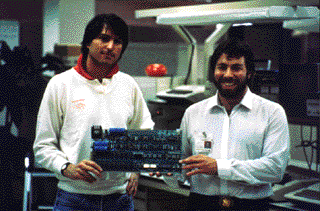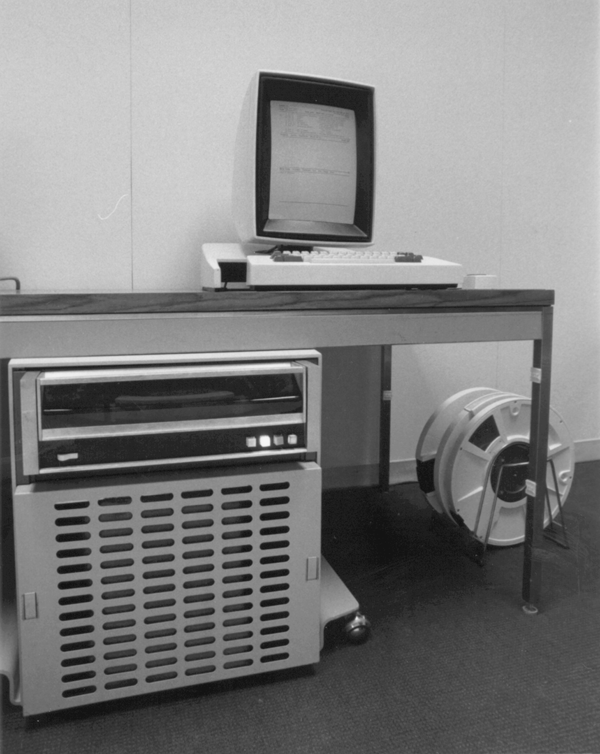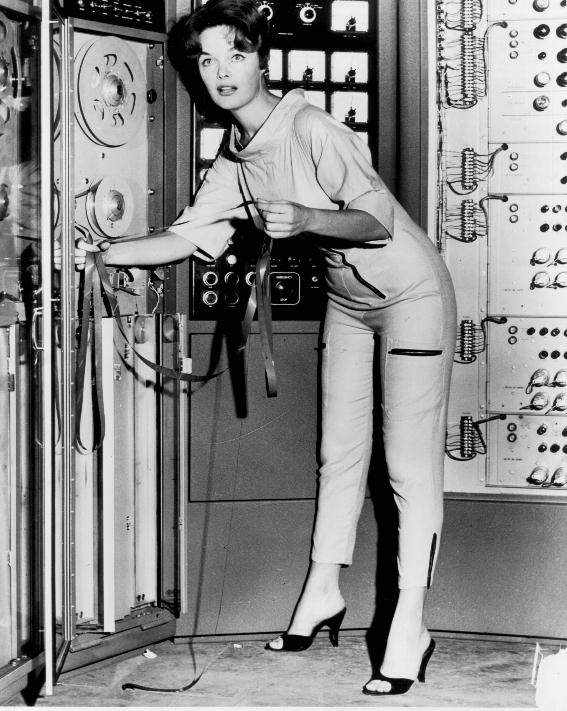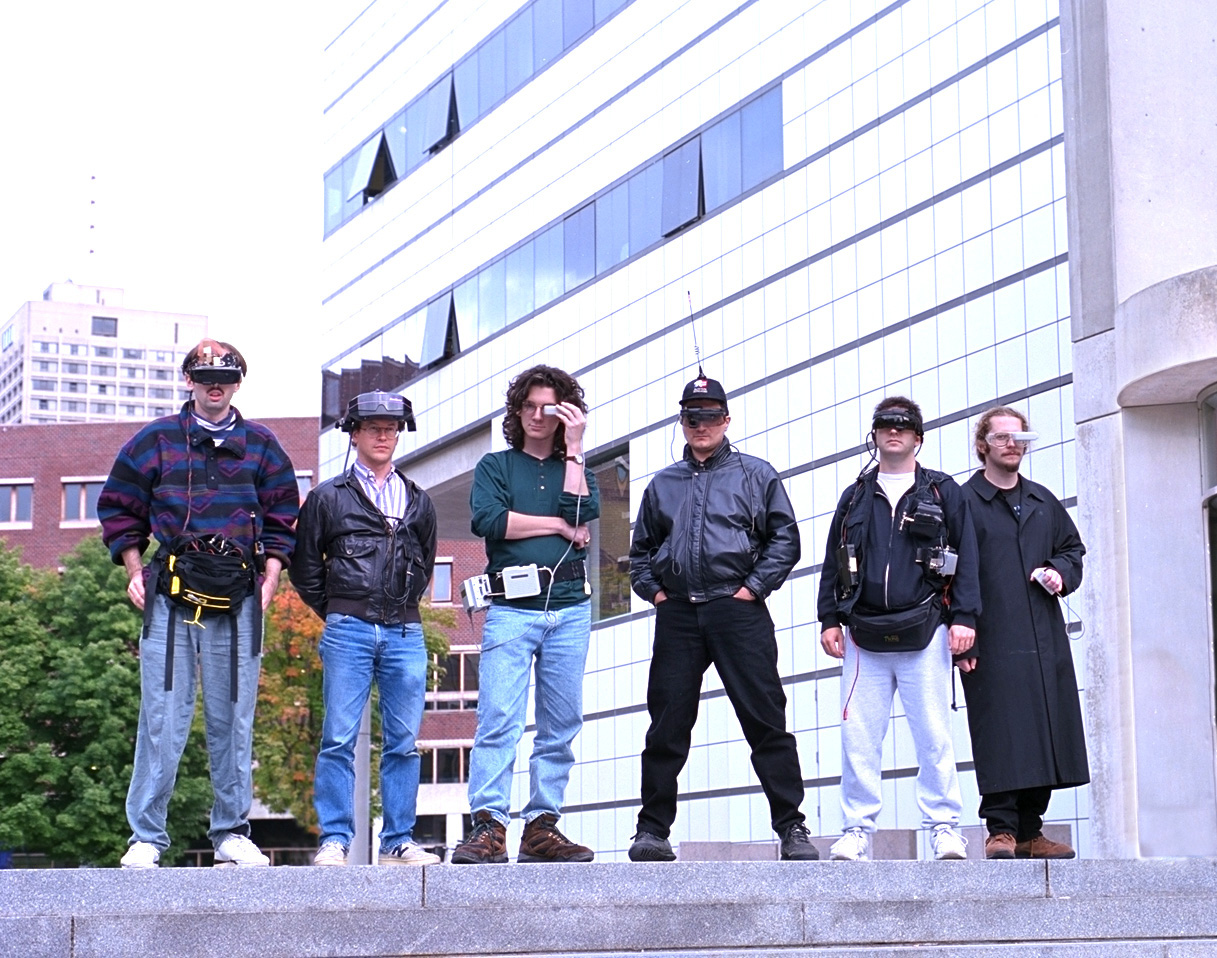The New Revolution: Information Technology
Tom Kelliher
Goucher College
Feb 26, 2001
- Connections.
- Where Did It Begin?
- Where Has It Been?
- Where Is It Going?
- What Does It Mean?
What is included in ``Information Technology?''
Connections between the Information Revolution and previous revolutions.
- Why were books/computers created?
- How has the usage changed?
- How many computers were said to have been needed?
- The computer swallows print media:
Time Warner's WWW site.
About Mr. Babbage.
About Countess Lovelace
Eniac photographs.
- Bureau of the Census machine.
- The 1952 presidential election.
The dream of your own computer
- The tyranny of numbers. (chips)
- The Microprocessor.
- The Altair 8800.

- The Xerox Alto.

- Cray Systems
Cray photographs.
- Apple II
- IBM PC
- Apple Macintosh
A Brief History of the Internet
Changing user interfaces, changing uses:
- Email.
- Telnet.
- FTP (Archie).
- USENET.
- Gopher (Veronica).
- HTTP (Lycos, Yahoo, WebCrawler, ...).
Hollywood and Computers.
A ``typical'' Hollywood interpretation?

HPCC Project.
Some recent challenges:
- Digital Libraries.
- Virtual Reality.
- Public Access to Government Information.
- Electronic Commerce.
- Civil Infrastructure.
- Education and Lifelong Learning.
- Energy Management.
- Environmental Monitoring.
- Health Care.
- Manufacturing Processes and Products.
Smart rooms, desks, and clothes.

- Chess.
- Slagel's calculus program --- expert systems.
- Weizenbaum's ELIZA
- The nonsensical block stacking program.
- Lenat's CYC --- the role of common sense.
- Neural Nets --- The CMU self-driven vehicle, tank finding.
- The Turing Test.
- Today: Information doubles every 2.5 years.
- 2020: Information doubles every 73 days.
- The consequences?
- The rise and decline of the middle class.
- A rural computerization program?
- The role of distance learning and digital libraries.
- Signing for a credit card purchase.
- Giant Eagle Advantage cards.
- Cross-referenced data bases.
- The Singapore experiment.
-
Internet Stalking.
-
Cyberadultery.
- The legality of selling names --- mailing lists.
We're under a microscope.
Internet Regression
- "Talking on the Internet, people regress. It's that simple." ---
Norman Holland.
- Symptoms: flaming, sexual harassment, and extraordinary generosity.
- Computer as extension of the brain.
- "Mine is bigger than yours" games.
- Dependency and addiction.
- AT&T long distance service outages.
-
The Pentium Papers.
- The air traffic control computers at Pittsburgh International
Airport.
Source:
The Machine that Changed the World.
- Print media --- Digital media.
- 450 books on one CD.
- Real world digitized into digital form --- permanence; no
degradation.
- Digitized information amenable to rapid transmission. (Information
sent down wires at the speed of light.)
- Global communications lead to shrinking world --- disappearance of
``place'' as an attribute.
- Physical presence vs. ``electronic presence'' --- new forms of social
interaction.
- Global communities --- distance no longer an obstacle. (Financial
traders part of global financial community --- physically separate but part
of the same ``community.'') London Stock Exchange --- physical
``marketplace'' rendered redundant.
- New social gatherings --- linked by common interest, not geography.
Internet and USENET --- new forum for exchange of ideas. Cold fusion ---
quicker interchange of ideas via USENET news than possible via existing
journals. SeniorNet --- computer networks entering everyday lives.
- Electronic presence. (Left by electronic traces we leave behind as
part of our day to day lives. Constant information gathering.) Data
pollution --- wrong information propagated between computers and
databases. (Disrupts thousands of lives per year.) Invasion of privacy ---
casual information gathering can give rise to distorted views of
individuals.
- Electronic sweat shops. Technological evolution outpacing social
evolution. (Alvin Toffler, ``Future Shock.'') 1987 Stock Market
crash. (``Programmed selling'' instigated avalanche of selling leading to
508 point crash.)
- Effect on stability of social systems.
- Singapore --- developed nation status via transformation into an
``information society.'' ``Digitization'' of Singapore --- Land Data
Hub. (Database on all aspects of Singapore; complete electronic record.)
Singapore --- total electronic efficiency. Social engineering and control
of people vs. tool for democracy.
- MINITEL --- large growth from one to 12,000 choices. 1986 ---
Student protests against admissions policies successfully coordinated via
MINITEL.
- Dependence upon computers. Computers programmed in ``craftsmanlike''
manner. Software errors --- no reliable engineering techniques for the
production of software. Software bugs --- human consequences; Therac-25
radiation machine software malfunction. AT&T telephone system crash
caused by a single line of bad code. (Bug causes 20,000,000 phone calls
being unable to connect and cripples phone network.) Untestability of
large software systems. 1989 --- Dallas Fort Worth airport computer
failure. Unlike traditional engineering, small errors can completely
cripple entire software systems. Wheel turns full circle: Babbage's
inspiration stemmed from the desire to eliminate errors. However, computers
are still prone to errors via programmers, as in Babbage's time.
Communication central to digital future.
- A fragmented sense of time and a loss of the so-called duration
experience, that depth phenomenon we associate with reverie.
- A reduced attention span and a general impatience with sustained
inquiry.
- A shattered faith in institutions and in the explanatory narratives
that formerly gave shape to subjective experience.
- A divorce from the past, from a vital sense of history as a
cumulative or organic process.
- An estrangement from geographic place and community.
- An absence of any strong vision of personal or collective future.
(From P. J. Davis, ``I'm not a Luddite, but ...'' SIAM News, Mar. 1996.)
The Unabomber:
The Industrial Revolution and its consequences have been a disaster for the
human race. They have greatly increased the life-expectancy of those of us
who live in ``advanced'' countries, but they have destabilized society, have
made life unfulfilling, have subjected human beings to indignities, have
led to widespread psychological suffering (in the Third World to physical
suffering as well) and have inflicted severe damage on the natural world.
The continued development of technology will worsen the situation. It will
certainly subject human beings to greater indignities and inflict greater
damage on the natural world, it will probably lead to greater social
disruption and psychological suffering, and it may lead to increased
physical suffering even in ``advanced'' countries.
Kirkpatrick Sale:
The central point the Unabomber is trying to make --- that ``the
industrial-technological system'' in which we live is a social,
psychological and environmental ``disaster for the human
race'' --- is absolutely crucial for the American public to understand
and ought to be on the forefront of the nation's political agenda.
I say this, of course, as a partisan. The Unabomber stands in a long line
of anti-technology critics where I myself have stood, and his general
arguments against industrial society and its consequences are quite similar
to those I have recently put forth in a book on the people who might be
said to have begun this tradition, the Luddites. Along with a number of
people today who might be called neo-Luddites --- Jerry Mander, Chellis
Glendinning, Jeremy Rifkin, Bill McKibben, Wendell Berry, Dave Foreman,
Langdon Winner, Stephanie Mills and John Zerzan among them --- the Unabomber
and I share a great many views about the pernicious effect of the
Industrial Revolution, the evils of modern technologies, the stifling
effect of mass society, the vast extent of suffering in a machine-dominated
world and the inevitability of social and environmental catastrophe if the
industrial system goes on unchecked.
Thomas P. Kelliher
Last updated May 26, 2021.
Tom Kelliher





